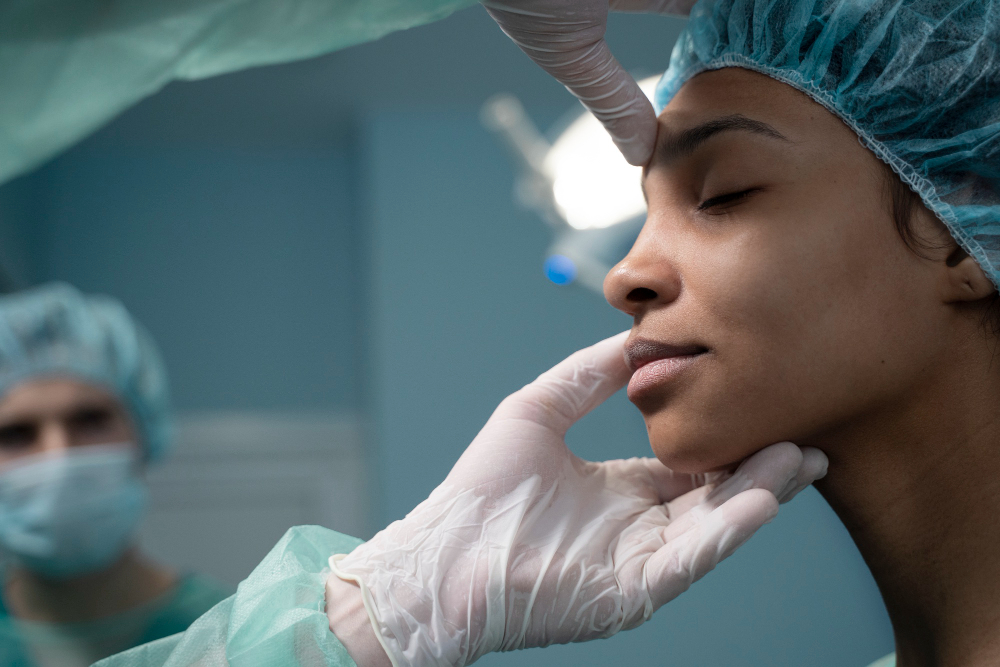While millions of procedures have resulted in remarkable outcomes, many people still hesitate when it comes to cosmetic work on their face. There tends to be a psychological component that motivate individuals to proceed with a particular procedure. They often search for answers to questions such as “Does a facelift improve confidence?”, “Does rhinoplasty help with self esteem?”, or “Is cosmetic surgery linked to psychological benefits?” Research suggests that for many individuals, the answer is yes. Facial plastic surgery can influence mental well-being, confidence and quality of life in meaningful ways.
Why do people feel better after facial plastic surgery?
Many patients feel better because their appearance finally aligns with how they feel internally. A deep plane facelift, for example, can restore youthful contours that better reflect a person’s natural energy and personality. As Dr. Mark Samaha, a leading facial plastic surgeon who specializes in deep plane facelifts, explains, “The procedure is more advanced and complex” and the results typically look more proportionate and natural-looking. This helps patients feel more comfortable and confident in their appearance. The long-lasting nature of modern techniques also reassures patients that their refreshed look will endure, further strengthening the psychological benefits.
Can a procedure increase confidence?
Yes. Improved confidence is one of the most consistently reported outcomes after facial surgery. People often feel more relaxed socially and less preoccupied with how they look.
One study published in the journal Clinical Psychological Science followed patients who chose cosmetic surgery and compared them with people who wanted surgery but did not have it. Those who underwent surgery were found to be generally psychologically healthy but reported wanting to feel better about their body. They also tended to have realistic expectations.
The Big Bang Theory actress Kaley Cuoco has openly discussed her facial plastic surgery. She told Women’s Health magazine that “I had my nose done… best thing I ever did.” She added, “but if it makes you feel confident, that’s amazing.”
Do facial procedures change motivation and self-care?
Many patients report feeling more positive about themselves after a facial procedure, which can naturally encourage better self-care. An analysis in Aesthetic Surgery Journal found that patients who underwent facial rejuvenation reported improvements in quality of life, psychosocial well-being, and satisfaction with their appearance. Many participants also described putting more effort into maintaining their results, which reflects a meaningful increase in self-care motivation following surgery.
A well-known example comes from designer Marc Jacobs, who openly shared his facelift journey with Vanity Fair. Reflecting on how the procedure fit into his overall well-being, he said that “self-care on every level… external and internal wellness are really important. The better I feel about myself, the better I’m able to be to others.” His experience highlights how feeling better about one’s appearance can strengthen personal motivation, encourage healthier habits and support a more positive sense of self.
Does facial surgery improve online and in-person social interactions?
When someone feels less self-conscious about a facial feature, social interactions often become easier. Patients frequently describe feeling more open, expressive, and comfortable in day-to-day communication. They may smile more naturally, make better eye contact, and feel less preoccupied with how they appear.
According to the American Academy of Facial Plastic and Reconstructive Surgery, many patients seek facial procedures because of increased self-scrutiny from video conferencing, a desire to feel refreshed when returning to in-person activities, and motivation to present themselves confidently in both social and professional environments. While the AAFPRS trend surveys highlight these motivators, they do not report formal patient-measured improvements in social comfort. However, both surgeons and patients commonly note that reduced self-consciousness can indirectly support more positive social interactions.
Does feeling better about your face improve emotional stability?
Yes. Research in aesthetic medicine shows that many patients experience improvements in emotional well-being after cosmetic procedures. Several reviews in the Aesthetic Surgery Journal and other peer-reviewed sources report that reductions in appearance-related stress, improved mood and better self-esteem are common when patients are good candidates and have realistic expectations. Although findings vary between studies, the overall trend suggests that feeling more satisfied with one’s appearance can ease day-to-day anxiety and support healthier emotional regulation.
One large review published in the Aesthetic Surgery Journal concluded that “the majority of aesthetic surgery patients achieve positive psychosocial and psychological outcomes,” including reductions in anxiety and improvements in mood and self-esteem. These psychological benefits can help patients handle social situations more comfortably and maintain a more stable emotional baseline.
Does facial plastic surgery change your identity?
Facial plastic surgery does not turn someone into a different person. Instead, it often removes emotional barriers that have been getting in the way of how they show up in the world. The result is usually subtle to others but powerful to the individual.
How important are expectations?
Expectations are crucial. People who pursue surgery for personal, well thought out reasons tend to have the best psychological outcomes. Those who expect surgery to solve unrelated emotional difficulties are more likely to feel disappointed.
Overall, facial plastic surgery can offer meaningful psychological benefits when it is chosen for the right reasons and performed by an experienced, ethical surgeon. Many patients report increased confidence, reduced anxiety, better social interactions, more motivation for self care and a stronger sense of alignment between how they feel and how they look. For someone who has struggled with a specific feature or early signs of aging, addressing that concern can be less about chasing perfection and more about finally feeling at ease in their own skin.

